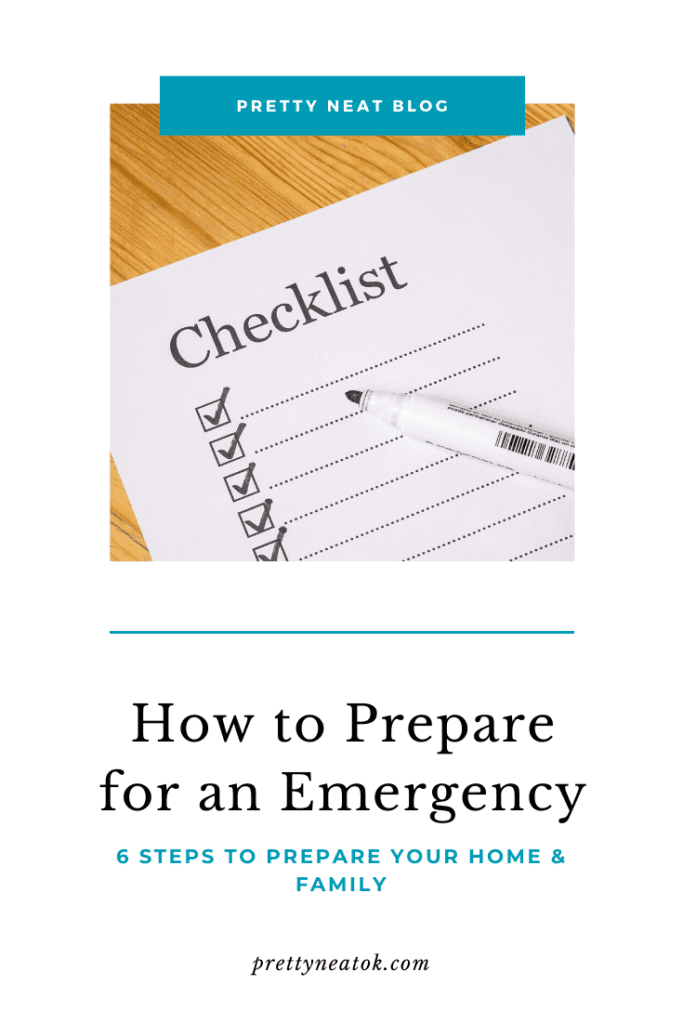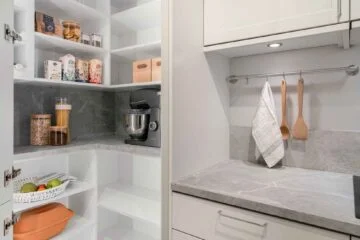Emergency Preparation
If you have ever experienced a natural or manmade disaster, you know the importance of acting swiftly. While no one wants to go through emergencies, sometimes it is unavoidable. If a disaster were to occur right now, could you say you and your family are prepared? Is your home organized to where you could find what you need quickly?
Depending on what part of the world you live in you could be likely to experience earthquakes, fires, hurricanes, tornadoes, or like the current events. While these aren’t the most fun things to discuss, I do think it is important to be prepared and ready for whatever life or mother nature decides to throw at you.
That’s why I’ve put together a list of categories you can start getting in order so you can be prepared. My goal is to get you thinking of ways you can help prepare your household for a disaster, should one occur. No one is immune to emergencies, but we all can take steps to prepare.

6 Things to Get in Order in Case of Emergency
1. Show me the Money
Keep cash at home. In a world where everything can be purchased with the swipe of a card, venmo, or apple pay, it is pretty unusual to be carrying cash. If a situation occurred where there was an extended time without internet or power, would you be able to purchase supplies you need?
Be sure to store your cash somewhere safe, yet easy to get to. No, I’m not talking about the freezer or under the mattress. Consider a safe or lockbox that is located in a room close to the garage or another exit of the house.
How much should you have on hand? There is no right or wrong answer, but most disaster resources encourage families with 4 or more people to have at least $1000 on hand. Make sure you have small bills too. The chances of a business or store being able to give you change could be slim.
2. Electronics
Always charge your phones, tablets, and laptops at night. Many often wait to charge their electronics, especially phones, when they wake up. But what would happen if disaster struck in the early morning or at night when you are asleep? Would your battery be full or a sad 12%?
Consider storing electronics in one central location when they are not being used and use a power strip. This is especially important if you would need to leave your home. When you locate another outlet, having a power strip would enable you to charge more devices at once, rather than one at a time. Here are some command center ideas that can be in your central area of your home or incorportate it into your office organization.
3. Food & Water
Pantry and home organization can help to prep for a disaster with food and essentials. Keep a stock of nonperishable items and bottled water that you specifically have on hand in case of a disaster. Do not dip into this reserve. Be sure each member of the family knows it’s for emergencies only.
4. Grab and Go Folder
Another important tip for home organization and prepping your space is to get important papers inorder. Create hard copies of driver’s licenses, birth certificates, and passports to store in this one folder. Create an emergency contact list of family members. Should your phone die and you need to use someone else’s, would you remember the number you need off the top of your head?
Passwords and username list should also be added to this folder. I don’t mean your Netflix login. I’m talking account numbers and logins to things like your mortgage, bank, and insurance.
Finally, add in any titles and registrations. Car, boat, motorcycle, motor home. Whatever it might be, add it to the folder and make copies. Here are some more tips on office organization to get your papers in order.
5. Pets
Our pets are family. It is important to consider their needs in your emergency plan as well. Storing a crate or kennel in the garage along with their leash is a great way to be prepared. While you might think you only need a leash for your sweet pup, remember that in the event of you having to stay in a shelter or travel, would you be able to container your pet for their safety?
6. Out of State Contact
Appoint one person, whether it be a friend or family member, that lives out of your state, that you can contact in case of an emergency. This way you can distribute information to this one person and from there they can provide updates to other family members. This keeps your battery life of your phone from being drained and your line open for important emergency communication.
Better to Be Safe Than Sorry
While disasters are never something we want to experience, the ability to get prepared alleviates worry and allows peace of mind. Take away the stress by setting time aside each week to set up the items above.
Need help setting up home organization in the event of a disaster? Pretty Neat can help. Contact us today.
Wandering if you need professional organizer? Get our guide here.
See you soon,
Audra


